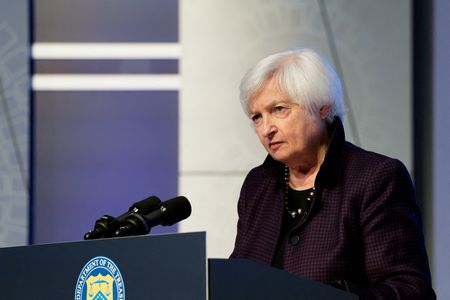By Timothy Gardner and Andrea Shalal
WASHINGTON (Reuters) – Western economies agreed new price caps on Friday on Russia’s exports of oil products that U.S. Treasury Secretary Janet Yellen said would build on the crude oil cap set in December and further limit Russian oil revenues while keeping global energy markets supplied.
The coalition imposing the measures, the Group of Seven economies, the EU and Australia, set the new price caps at $100 per barrel on products that trade at a premium to crude, principally diesel, and $45 per barrel for products that trade at a discount, such as fuel oil and naphtha.
The price caps, together with a European Union ban on Russian oil product imports that also comes into force on Sunday, seek to limit Moscow’s ability to fund its war in Ukraine, which began nearly a year ago.
“The caps we have just set will now serve a critical role in our global coalition’s work to degrade Russia’s ability to prosecute its illegal war,” Yellen said in a statement after the agreement was released.
The move followed the coalition’s Dec. 5 banning of the use of Western-supplied maritime insurance, finance and brokering for seaborne Russian crude oil priced above $60 per barrel.
Yellen said the sanctions and price caps are forcing Russian President Vladimir Putin to “choose between funding his brutal war or propping up his struggling economy.”
Russia’s monthly budget revenues from oil and gas fell in January to their lowest level since August 2020 under the impact of Western sanctions on its most lucrative export, Russia’s Finance Ministry data showed on Friday.
This month, Russia plans to boost diesel exports in an attempt to cope with the EU embargo, price cap and lack of tankers, data from traders and Refinitiv showed.
Yellen said global energy markets had remained well-supplied and public reports indicated that oil importers such as China and India were using the price cap to “drive steep bargains” on Russian oil.
The measures are disrupting Russia’s military supply chains, “making it harder for the Kremlin to equip its troops and continue this unprovoked invasion,” Yellen said.
In February last year Putin ordered what he called a “special military operation” in Ukraine to protect Russian security.
The International Monetary Fund this week raised its 2023 growth projection for Russia by 2.6 percentage points, citing “fairly high” export revenue last year and strong fiscal stimulus from Moscow.
A senior Treasury official told reporters that while Washington was mindful of the IMF’s view, it remained convinced that the price caps were “changing the trajectory” of Russia’s budget because petroleum was the main source of revenues.
(Reporting by Timothy Gardner; editing by Grant McCool)

